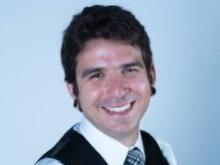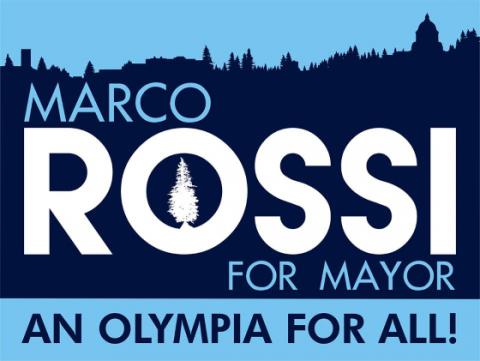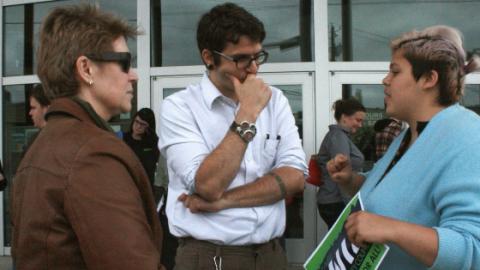My Hope is to Win

Marco Rossaire Rossi, a contributor to the New Compass blog and author of our pamphlet A Politics for the 99%, is part of a group called Olympia for All who participates in the municipal elections in Olympia, Washington (USA). Three positions in the city council are decided in this year’s election. Raymond Guerra, one of the platform's candidates, did not make it through the first election round. But Rossi, who is the group's candidate for mayor, got almost 30 per cent of the votes and will be running in the second round with Rafael Ruiz to promote their vision for Olympia. We have already published the group's platform on the New Compass blog. In this interview, Rossi, talks more about the campaign, its ambitions and results so far.
What is Olympia for All?
Olympia for All was a campaign slogan developed by our campaign manager. Our strategy was to develop a platform with progressive, but easily doable, reforms, and have a slate of candidates run on this platform. This way, if nothing else, we would be able to move the debates during the election season into a different direction. Issues that affect poor people, people of color, transgendered individuals, issues like environmentally sustainable growth, local democracy, police accountability, these issues could take center stage rather than be left on the periphery.
What are the main aims of your group? What kind of obstacles do you see in achieving these aims?
We are involved in an election, so of course our main aim is to win. We realized rather quickly just how much the odds are stacked against us. First, we have chosen to go outside of the Democratic Party. In Olympia, the Thurston County Democrats essentially control the political process. Loyal Democrats who run for office have a wealth of campaign resources, networks, and endorsement at their disposal. Independent candidates have to work twice as hard to make up these gaps. Second, we are all low income people with limited resources who are trying to organize other low income people with limited resources. Among low income people, voter turnout and politics participation tends to be low, and trying to motivate others is difficult when you are pulled away from the campaign because of work (or in some cases struggling with unemployment) and family obligations.

The primary elections were held now in August, and Raymond Guerra – one of your candidates for city council got 16,63 per cent of the votes and is not through to the general election in November. You got 27,38 per cent of the votes as candidate for mayor and are through to the next round. Can you explain me the purpose of the primary elections and how you assess the results for your part?
The United States does not operate on a parliamentary system where people vote for parties. Instead, we vote for candidates directly. On the local level, as in Olympia, positions are often non-partisan, meaning you do not have to declare a party membership to run. If there is more than two candidates running for office, then the purpose of the primary is to narrow the race down for the general election. As for how we did, not as good as we were hoping for, but not terribly off. Unfortunately, one of the members of our slate did not make it pass the primaries. That means that as we move forward a lot of the attention is going to the mayoral race.
What are your (realistic) hopes in front of the general election?
I would not be involved in this campaign unless I wanted to win it. In that sense, my hope is to win.
What do you think it is possible to achieve if you are elected?
Municipal governments have very limited powers in the United States. Many of the more radical proposals that I explored with people—such as creating a municipal bank and instituting city owned cooperative enterprises—would not be possible without major changes to the Washington State Constitution. All the other parts of our platform could be done on the municipal level. Making them a reality is dependent on putting enough pressure on hesitant council members to support them and working to build a community consensus in favor of them.
Are there any potential problems you may encounter if you are elected as mayor or councilors, and how do you plan to confront them?
There are several possible problems. It will be very difficult to work within the city bureaucracy and maintain a close relationship to social movements. Also, we will have to maintain a cooperative relationship with other council members, but the same time must be diligent about our commitment to the platform. We have had ongoing discussions on how to address these problems. Essentially, the solution I (and I think others) are coming to is that we need a new type of political party within the Left. In a certain sense, we need to follow the syndicalist model, but instead of promoting worker democracy solely in the factory, we need to be promoting direct democracy within governments. We need a party of direct democracy that can run candidates, hold them accountable, and socialize people in the virtues of direct political engagement all at the same time.
Video: Marco Rossaire Rossi being interviewed at a local radio station about his participation in the race for mayor of Olympia, Washington.
Why did you choose to run for local elections to address problems such as low wages, police accountability, excessive CO2 emissions or homelessness? Aren’t there other ways of addressing them?
There are other ways of addressing Olympia’s problems, and we are not opposed to exploring those options. This election has really been an experiment in social movement politics. We see our campaign as working alongside and supporting other social movements here in Olympia. Raising the minimum wage to $15 and guaranteeing all workers in Olympia paid safe and sick leave is part of our platform, and we have reached out to other organizations—such as Working Washington—that are involved in these issues. Police accountability is also one of our main planks, and, similarly, many of the people who are involved in our campaign are working with Black Lives Matter on the same issues.
Where do the ideas behind your platform stem from? Does the inspiration come from social ecology/communalism/libertarian municipalism?
Our platform developed through informal discussions with people about what mattered to them in Olympia. Throughout our campaign, there have been some changes to it. But, for the most part, it is essentially what we drafted up at the start of the campaign. Again, the emphasis was on progressive but achievable reforms. It is hard to rally people around the idea of smashing the state and having everything run by direct democracy, but people are interested in creating electoral districts and making the city manager an elected position. Those changes are not panaceas, but they are important steps forward. One of the themes of the platform, and of our entire campaign, is working toward idealistic utopian goals within a framework of pragmatic political realism.
I consider myself a communalist, and obviously Murray Bookchin's work has influence me personally, but Olympia for All is not a communalist organization. We come from a variety of backgrounds. What I find most interesting about Bookchin is the theme he was inching toward in his late work: that in order to smash the state we will need a government, and creating that government is reliant on challenging our notions of politics, democracy, and citizenship. As for other terms, such as social ecology and libertarian municipalism, I find myself questioning their meaning on a daily basis. Over the years I have become more critical of the things that I think Bookchin got wrong and more appreciative of the things that he got right. Personally, I still feel conflicted about how to separate the two, and what it means to be inspired by his work going forward.
How many are you? Do you have any ties to other movements or groups outside of city council?
We have three candidates. We wanted to run a candidate for each seat that was up for election this year. Each of us has ties to other social movements. Ray Guerra works with Rachel Corrie Foundation. Rafael Ruiz has been organizing with Black Lives Matter. I am a steward with UFCW 21.
Can you shortly describe how you have conducted your election campaign so far, and what are the plans in front of the general election in November?
My biggest regret is that we jumped into this process late. Because of that, we are constantly juggling between reaching out to current voters and attempting to build a new base of support by registering new voters. For the primaries, we focused on areas where we thought we would be do the best, and—at the same time—focused on getting poor people out to vote. In the terms of our numbers, it probably hurt us. But, in the terms of building support in the long run, I think it will help us.
What kind of support – and from whom – have you received during the campaign?
The majority of our support has come from unions and young people. The union support has really helped us, and the energy from young people excited about our campaign is a real asset. However, if we are going to be successful, then we have to broaden our base. Right now, we are looking at appealing to other groups and populations.

Image: Marco Rossaire Rossi listening to a potential supporter outside of city hall. Photo: http://www.janineslittlehollywood.blogspot.com/
Are there many other platforms like yours in the forthcoming elections, or are you unique in a US context?
I have heard of other leftwing groups in the United States experimenting with social movement politics and municipal socialism. Kshama Sawant from Seattle was a big inspiration for us. I imagine a lot of their platform points speak to the issues of their communities. Some of the people involved in our campaign attended the Socialism Conference in Chicago this year and talked about our campaign with others. I was told a lot of people were impressed with our platform and campaign. So far, our gains have been fairly modest, but it is encouraging to see the enthusiasm of similar groups. Hopefully, we will all be able to learn from each other’s campaigns.
Do you encourage others to run on similar platforms, and if so, why?
Yes, for three reasons. First, the legacy of electoral absenteeism within the left, particularly within anarchism, has been a disaster. It is a complete dead end. Just because you do not vote does not mean political power dissolves. Instead, it moves political power away from those who are not willing to vote into the hands of those who are willing to vote. People fought long and hard for the right to vote, many of them gave their lives, and they did so for a reason. We should use this right to expand other rights, not naively assume that if we forsake it then other rights will spontaneously appear.
Second, if you are really interested in forming a broad democratic movement, then you will organize people when they are most engaged. The truth of the matter is that people are most interested in politics during election seasons. That is the time when people are most willing to listen to new ideas and explore issues. There is no valid reason to squander this opportunity, and doing so makes us bad activists.
Finally, if we are going to live differently, if we are going to find humanistic alternatives to capitalism and nation-states, then we need to start experimenting with new forms of political organizations; specifically, we are going to need a new form of government. Local elections and municipal governments provide us with opportunities for this experimentation. This does not mean everything will be perfect or that there are no pitfalls. The chances for failure are actually numerous. However, instead of treating these mistakes and pitfalls as excuses to not engage in local politics we should treat them as part of the learning process in making government more democratic.